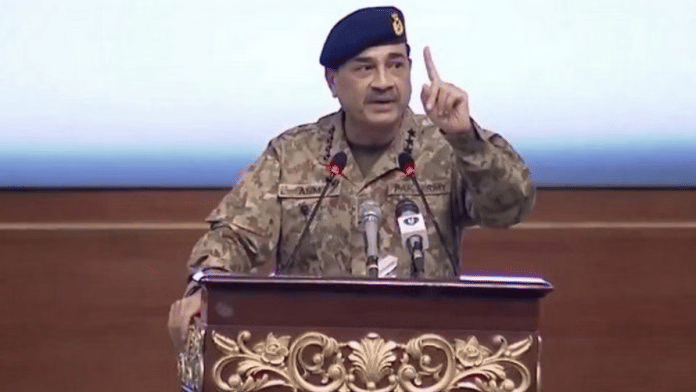New Delhi: Pakistan army chief Field Marshal Asim Munir told a delegation of Saudi Arabian diplomats that “India is like a shining Mercedes, but we are like a dumper truck, filled with rocks and rubble”. “Imagine, now, if the truck crashes into the car, what the state of the Mercedes will be,” he said. The remark was made amid the military hostilities between India and Pakistan in May at a meeting attended by Prime Minister Shehbaz Sharif and Deputy Prime Minister Mohammad Ishaq Dar, the country’s Federal Interior Minister Mohsin Naqvi said over the weekend.
Munir’s unusual choice of metaphor had raised eyebrows, when it was first revealed by ThePrint, after he used it in an address to the Pakistani diaspora in Tampa in the United States earlier this month. It is unclear what the Saudi diplomats, who were engaged in shuttle diplomacy intended to defuse the crisis, made of the comments.
“God has made me the protector of the country, and I do not desire any other position. I am a soldier and my greatest desire is martyrdom,” Field Marshal Munir told his audience in Brussels this weekend, journalist Suhail Warrach reported.
The report suggested that he was given the kind of reception more appropriate to the victor of a jihad, or holy war. Warriach wrote that Munir was “welcomed as the victor of the war, one overseas Pakistani even bowed and kissed his hands, and many paid tribute to him for the victory of a Muslim country over an infidel country after centuries”.
The Field Marshal’s proclamation that he had been raised to high office by God startled some in Islamabad, since Pakistan’s constitution vests the rights to appoint military chiefs with the President, in consultation with the Prime Minister.
Afghanistan’s ruling Islamic Emirate also came in for criticism from Munir, who repeated remarks made in Tampa. He warned the Afghan government to stop pushing the Taliban into Pakistan, “otherwise it is our duty to avenge the blood of every Pakistani”. Pakistan, he said, “has shown kindness and favours to the Afghans for years, but instead of avenging them, a conspiracy is being hatched against us in collaboration with India”.
In response to a question from the audience on the prospect of reconciliation with incarcerated former prime minister Imran Khan, Munir responded with a Quranic parable—the angels created by God were incited by Satan to be hostile to the first man, Adam. All the angels but Adam apologised for their behaviour though, and were reinstated to their divine status. The Devil was, however, cast out.
Though he dismissed rumours that the Pakistan Army might be preparing to play a more direct political role in the country, he dwelt at length on its economy and future. Munir offered an expansive vision of Pakistan’s economy, which would “place Pakistan among the developed countries of the world within five to ten years”.
Estimating that the Reko Diq copper mines in Balochistan would bring in an annual profit of $2 billion from next year—though operations would not begin until 2028—he asserted that “Pakistan will soon be counted among the most prosperous societies”.
The Field Marshal’s deeply-held religious views have often sparked off commentary. In one speech, he had promised troops: “Those who fight Allah and his Prophet, and bring strife to the land will be punished in this life as well as the afterlife. This is your law. And this is Allah’s law. And because you are enforcing Allah’s law, you are his soldiers. There is no force on earth which can defeat you.”
Earlier, in April, he had underlined his commitment to the ‘two-nation theory’ that led to the Partition of India. “Our forefathers believed that we were different from Hindus in every possible aspect of life,” Munir had asserted. “Our religion is different. Our customs are different. Our traditions are different. Our thoughts are different. Our ambitions are different.”
(Edited by Mannat Chugh)
Also Read: ThePrint Exclusive: Asim Munir’s India nuke threat from US ballroom—‘will take half the world down’







Pakistan has a cause for its existence, which is ” To destroy India “. What is the purpose of Existence for India ?.